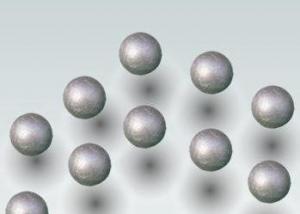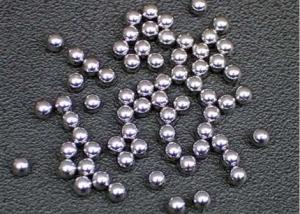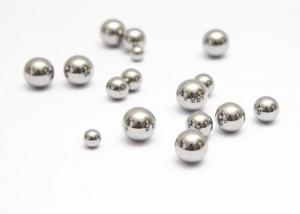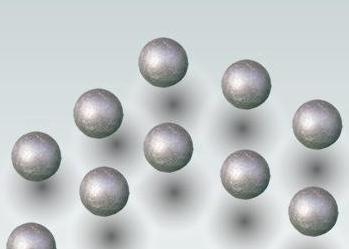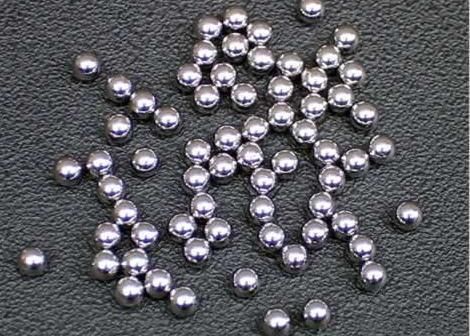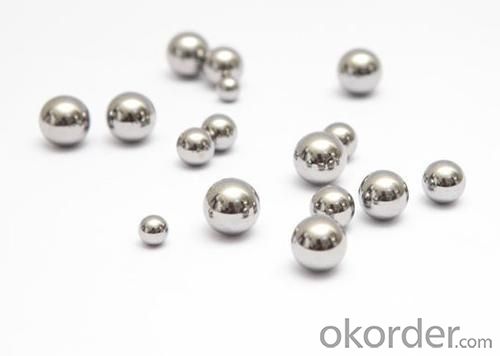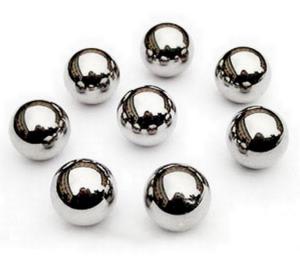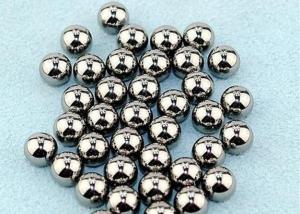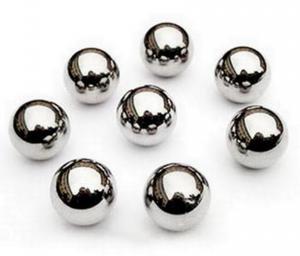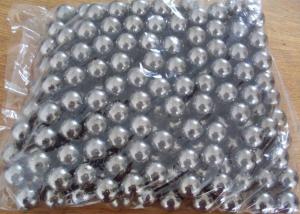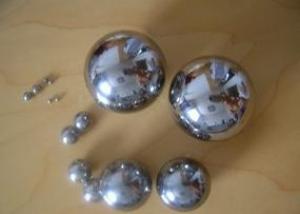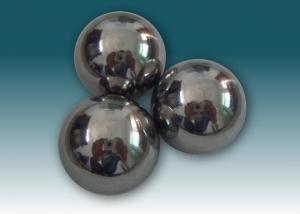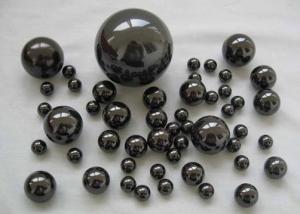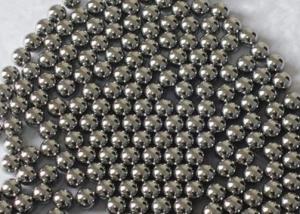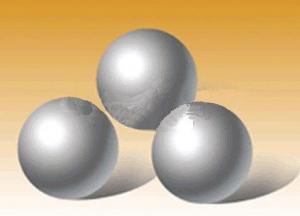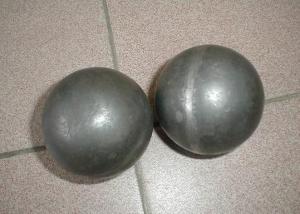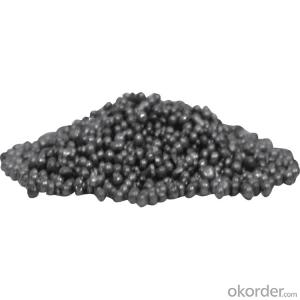Prime Quality Stainless Steel Ball
- Loading Port:
- China Main Port
- Payment Terms:
- TT or LC
- Min Order Qty:
- 5 Tons pc
- Supply Capability:
- 1000 Tons Per Month pc/month
OKorder Service Pledge
OKorder Financial Service
You Might Also Like
Stainless Steel Ball
MAIN PRODUCTS:
1. Material: AISI304, 316L, 420C, 430, 440C
2. Steel ball, with material AISI 1008-1086.
3. Chrome steel ball,with material: AISI52100
4. Flying saucer steel ball
5. Precision casting, including auto parts, machine parts, hardware handles, etc.
CHARACTER OF PRODUCTS:
1.The Grade of our products is from G10 to G1000
2.The dimension is from 0.5 mm to 25.4 mm.
3.The products from us are widely used in several industries, such as hardware, sliders, ball bearing lead screw, wheels, toys, bicycles, bearings, trust bearings pulleys, chemical industries, etc.
DETAIL SPECIFICATION:
|
Item |
SS304,316L,420C,440C Stainless steel ball |
|
Category |
Stainless Steel Ball |
|
Material |
AISI 420 430 440 SS304 316L |
|
Size |
0.5mm--25.4mm, 1/4",3/16",5/32",1/8",7/32",5/16",7/8",1" |
|
Grade |
G100-G3000 |
|
Hardness ( HRC) |
HRC58-65 |
|
Application |
Bicycle, bearing, pulley, slide, handcraft, shelf, luggage, hardware, grinding media |
|
Standard |
GB/T-308-2002, GB/T1148-93 |
|
Matched Standard |
DIN, JIS, ASME |
|
Certification |
ISO |
|
Packing |
Oily packing in pouch packing,plastic/tin box packing 1, 25kg/carton with steel pallet packing 2,25kg/carton without steel pallet packing 3,10kg/box then in wooden case packing 4,250kg/ steel drum packing or according to customers' requirement |
|
Place of original |
Shandong province, China |
|
Delivery |
Within 30 days or confirmed while placing order |
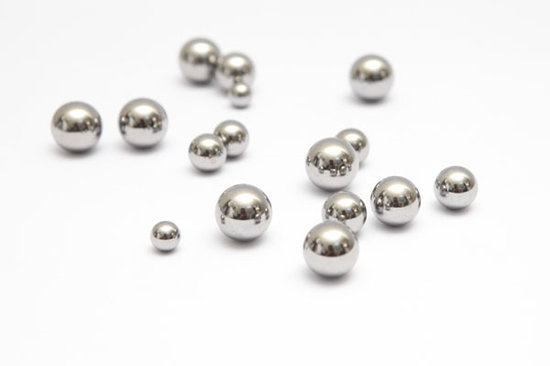
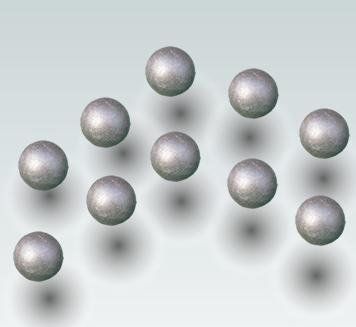
- Q: Can stainless steel balls be used in bicycle components?
- Yes, stainless steel balls can be used in bicycle components. Stainless steel is a durable and corrosion-resistant material, making it suitable for various applications in bicycles, including bearings and hubs.
- Q: Can stainless steel balls be used in medical devices?
- Yes, stainless steel balls can be used in medical devices. Stainless steel is a common material used in the manufacturing of medical devices due to its excellent properties such as corrosion resistance, durability, and biocompatibility. Stainless steel balls are often used in various medical applications, including surgical instruments, orthopedic implants, dental devices, and prosthetics. They are chosen for their ability to withstand harsh sterilization processes, their non-reactivity with body tissues and fluids, and their overall reliability. Overall, stainless steel balls are a suitable choice for medical devices as they meet the necessary requirements for safety, performance, and longevity in the healthcare industry.
- Q: How do stainless steel balls perform in high-radiation environments?
- Stainless steel balls perform exceptionally well in high-radiation environments due to their inherent resistance to corrosion and oxidation. The composition of stainless steel makes it highly suitable for withstanding radiation-induced damage, maintaining its structural integrity and functionality even under intense radiation exposure.
- Q: Are stainless steel balls suitable for use in food processing or packaging equipment?
- Stainless steel balls are a suitable choice for food processing or packaging equipment. They are commonly used in the food industry because of their resistance to corrosion, durability, and hygienic properties. With the ability to withstand high temperatures and being easy to clean, stainless steel balls do not react with food or beverages. They play a crucial role in various equipment like mixers, conveyors, sifters, and fillers, aiding in the movement, separation, and packaging of food products. Furthermore, these balls are non-toxic and do not release any harmful substances that could contaminate the food, making them safe and dependable for use in food processing and packaging equipment.
- Q: What are the different finishes available for stainless steel balls?
- There are several different finishes available for stainless steel balls, depending on the desired appearance and application. Some common finishes include mirror finish, satin finish, brushed finish, and bead blasted finish. Each finish provides a unique texture and look, ranging from a highly reflective surface to a more matte or textured appearance. The choice of finish can also affect the durability and corrosion resistance of the stainless steel balls.
- Q: The stairs one hand stainless steel ball luminous?
- Calculation of the amount of work, nothing more than the volume of concrete, steel weight. As in the general floor, only different is the ladder of plagioclase; structure calculation, is nothing more than the load and reinforcement.
- Q: Are stainless steel balls suitable for ball bearings?
- Indeed, ball bearings can indeed be made suitable by utilizing stainless steel balls. The employment of stainless steel for ball bearings is favored due to its numerous advantageous characteristics. Primarily, the highly corrosion-resistant nature of stainless steel prevents the occurrence of rust and thereby prolongs the lifespan of the ball bearing. This aspect is especially significant in situations where the bearing is exposed to moisture or harsh surroundings. Furthermore, stainless steel boasts exceptional mechanical properties, including high hardness and strength. These properties enable the bearing to endure heavy loads and rapid rotations without any deformation or failure. Additionally, stainless steel balls exhibit commendable dimensional stability and possess a low coefficient of friction, resulting in the smooth and efficient operation of the bearing. Moreover, stainless steel balls prove to be fitting for a broad range of temperatures, making them versatile in various industrial applications. They are frequently utilized in industries such as aerospace, automotive, medical, and food processing, where dependability and longevity are paramount. To summarize, stainless steel balls possess the requisite qualities to be deemed appropriate for ball bearings. Their resistance to corrosion, mechanical strength, dimensional stability, and tolerance for diverse temperatures render them an outstanding choice for ensuring the seamless and dependable functioning of ball bearings across a multitude of applications.
- Q: What are the wear resistance characteristics of stainless steel balls?
- Stainless steel balls exhibit excellent wear resistance due to their high hardness, corrosion resistance, and low coefficient of friction. They are capable of withstanding abrasive and corrosive environments, making them suitable for various applications such as bearings, valves, and precision instruments. Additionally, stainless steel balls have superior durability and can maintain their shape and surface finish even under heavy loads and repetitive impacts.
- Q: Can stainless steel balls be used in medical implants?
- Yes, stainless steel balls can be used in certain types of medical implants. Stainless steel is a commonly used material in the manufacturing of medical devices due to its high strength, corrosion resistance, and biocompatibility. However, the specific application and requirements of the medical implant should be considered to ensure the suitability of stainless steel balls.
- Q: What are the different grades of stainless steel used for manufacturing balls?
- There are several grades of stainless steel that are commonly used for manufacturing balls. The specific grade chosen depends on the intended application and the desired properties of the ball. One of the most commonly used grades is 440C stainless steel, which is a high carbon martensitic stainless steel. It offers excellent hardness, wear resistance, and corrosion resistance, making it suitable for applications where the ball needs to withstand heavy loads and harsh environments. Another popular grade is 316 stainless steel, which is an austenitic stainless steel. It is known for its excellent corrosion resistance, especially in marine environments. 316 stainless steel balls are often used in applications where the ball will be exposed to water or other corrosive substances. For applications that require high temperature resistance, 304 stainless steel is often used. This austenitic stainless steel offers good corrosion resistance and can withstand temperatures up to 800°C (1472°F). It is commonly used in applications such as automotive exhaust systems or high-temperature valves. Other grades of stainless steel, such as 302, 420, and 17-4 PH, may also be used depending on the specific requirements of the application. These grades offer a balance of different properties such as hardness, corrosion resistance, and magnetic properties. In summary, the choice of stainless steel grade for manufacturing balls depends on factors such as the intended application, desired properties, and environmental conditions. By selecting the appropriate grade, manufacturers can ensure that the balls meet the necessary requirements and perform optimally in their intended applications.
Send your message to us
Prime Quality Stainless Steel Ball
- Loading Port:
- China Main Port
- Payment Terms:
- TT or LC
- Min Order Qty:
- 5 Tons pc
- Supply Capability:
- 1000 Tons Per Month pc/month
OKorder Service Pledge
OKorder Financial Service
Similar products
Hot products
Hot Searches
Related keywords
